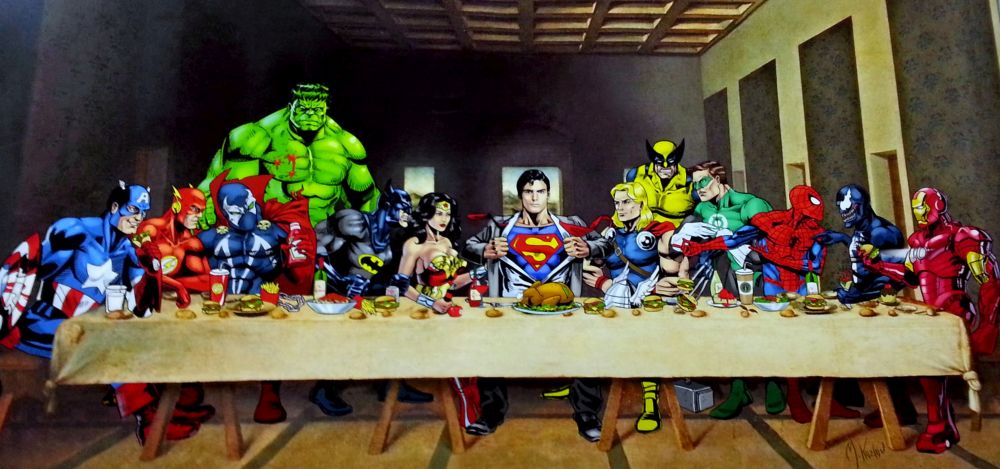I’ve always defined god as that which motivates a person the most. Whatever makes you get up in the morning or whatever makes you go to work for 40 hours or more a week, that is your god. For a lot of people, God is money. Money does after all affect almost every interaction we have on a day-to-day basis. It’s ridiculous to say you have no God or that your God is Jesus, Allah, or whoever when your every interaction is colored by a slavish service to money.
That said, money isn’t the only god on the scene these days. There are lots of gods: power, political ideology, and yes, even fictional characters like Spider-Man. It might seem ridiculous that I would argue that anyone would elevate Spider-Man or any other superhero to the status of a deity, but let’s look at the evidence.
As a purely financial measure, Spider-Man alone brings in a stunning amount of revenue, roughly $1.3 billion every single year. That’s more than if you won the largest lottery payout in history, and this is a yearly occurrence.
These days, it seems everyone I know is able to describe how Spider-Man got his powers — he got bit by a radioactive spider. Of course, Spider-Man isn’t the only superhero people are obsessed with. Most of my friends count themselves as X-Men aficionados and are able to list off dozens of members of the fictional team. Even grandparents know the names of the four Teenage Mutant Ninja Turtles. The average American can probably name more superheroes than biblical figures.
In short, geek culture is now mass culture. This is especially noteworthy since what is left of the culture has been thoroughly fragmented into all sorts of niche interests. Anything that can grab the attention of large sections of society is worth studying, if only to find out why.
It’s tempting to make moral judgments about various kinds of fandom. I enjoy this stuff too sometimes, but I can’t help but look down at the masses for continually consuming $200 million film spectacles, with little or no thought to the thin plots and questionable character motivations within.
In recent years, films have gotten a lot worse. Hollywood has transitioned to appeal to an international audience, especially in China and I suspect this has resulted in the visual spectacle becoming more dominant, replacing focus on plot and dialogue. But most Americans don’t seem too bothered by it. Domestic earnings for major blockbusters can now be expected to gross $300 million with relative ease.
Actor Simon Pegg, who has recently starred in two Star Trek movies (with plans for a third), took aim at the industry when he said that the dominance of low brow films has undermined the art form.
“Obviously I’m very much a self-confessed fan of science fiction and genre cinema,” Pegg said. “But part of me looks at society as it is now and just thinks we’ve been infantilized by our own taste. Films used to be about challenging, emotional journeys or moral questions that might make you walk away and re-evaluate how you felt about … whatever. Now we’re walking out of the cinema really not thinking about anything, other than the fact that the Hulk just had a fight with a robot.”
Proving that internet commenters lack reading comprehension, Pegg was quickly criticized for suggesting that “science fiction or fantasy were dumb,” prompting Pegg to apologize.
***
Just like the worship of any other false god, there’s a dark side to this fandom. Lately, the internet has been piling hate filled articles and comments on the (admittedly) awful looking Ghostbusters remake and the vacuous other superhero movies which now litter our dead cultural landscape. Fans are heavily invested in their favored fictional realities.
I think comic book writer Alan Moore said it best in an interview with The Guardian a few years ago. He argued that fans:
“…having given up on attempting to understand the reality they are actually living in, have instead reasoned that they might at least be able to comprehend the sprawling, meaningless, but at-least-still-finite ‘universes’ presented by DC or Marvel Comics.”
In other words, geek culture is no longer just an escape from a hostile reality, but a replacement for it. Making a film which depicts Superman as a violent mass-murderer is like defying the existence of God at church – you’re gonna get some nasty looks. It’s offensive to our shared mythos.
There does seem to be a tendency among the ‘nerd literati’ to want to hammer out the minute details of the various fantasy universes to such an extreme degree, that it can only be called a substitute for dealing with reality. Like Christians discussing transubstantiation in the middle ages, fans today wonder does Wolverine’s hair regenerate? Can Dwarfs and Elves be allowed to love? Whatever the debate, fans are ready to discuss it.
But some have clearly linked their self-esteem to these fantasy universes and the wrangling can get out of hand. Film producers and critics now have to deal with death threats just for having an opinion that differs from popular consensus.
When the new Captain America comic revealed the hero had actually been a member of the rival Hydra organization all along — gasp! — Marvel executive editor Tom Brevoort was sent this threatening letter supposedly by a disgruntled marine veteran, which might be a fake, but could easily be sincere:
“You have made the last 21 years of my life and the Code I lived by, the hardships I endured because I refused to sacrifice that Code MEANINGLESS… So, thanks to you two I will be throwing away my Moral Code, and become The Monster… I WILL find you eventually, and I WILL kill you in the most painful way possible that I can think of.”
Devin Faraci at Birth, Movies, Death attributes threats from irate comic book fans to their psychological dependence on the fandom. “It isn’t just a sense of ownership, it’s a sense of symbiosis,” Faraci writes. “The fan couldn’t tell where they ended and where the thing they loved began.”
***
Violence – whether physical or not – is always a sign of a deeper problem, but the trivial nature of superhero films has some confused. Why are fans motivated to make threats or write thousand-word treatises on something as unimportant as comic book fiction?
The impassioned defense of these fictional worlds is similar in tone to other kinds of fanaticism we see regularly. We already noted how the fanatical debates on the subjects of race, gender, and ideology are linked with staking out and defending personal identity. But really, people are ready to fight over anything and everything. The goal for activists, fans, and online bullies isn’t to change anything, but to pursue an existential sense of wholeness.
Consistency in comic book realities provides some meaning to its fanbase. Similarly, the debate surrounding the symbolic meaning of the confederate flag is no different than discussing whether or not Batman should be allowed to kill people. Both debates are pretty shallow, but attempt to hammer out a kind of absolute clarity that can stand up to criticism.
The activists’ need to define the exact limits of acceptable social behavior and fans’ desire to maintain stability in their fictional universes work as a substitute for a shattered reality.
For many people in our society, reality just no longer provides sufficient direction. We’re constantly looking for a new canvas to reshape reality and provide meaning. As a result, Americans are becoming fanatical in the weirdest ways. It may be as Dr. Gabor Mate once wrote, “Intensely held beliefs may be no more than a person’s unconscious effort to build a sense of self to fill what, underneath, is experienced as a vacuum.”

If you enjoyed this content, please donate. Even $1 or $5 makes a difference. You can donate via Paypal (see tip jar to the right) or with


